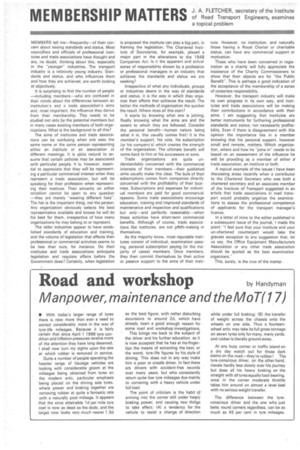MEMBERSHIP MATTERS Jof . A. o F a L d ET T C r H a n E s R p , o s r e t c r E e n t
Page 34

If you've noticed an error in this article please click here to report it so we can fix it.
agryi n eoefrtsh ee xl nasmt nuet es a topical problem
MEMBERS tell me—frequently--of their concern about raising standards and status. Most councillors and officials of professional institutes and trade associations have thought and are, no doubt, thinking about this, especially in the "younger" industries. The transport industry is a relatively young industry. Standards and status, and who influences them and how they are achieved, are worth looking at objectively.
It is surprising to find the number of people —including members—who are confused in their minds about the differences between an institution's and a trade association's aims and, most important, the influence they derive from their membership. This needs to be studied not only by the potential members but in many cases existing members of both organizations. What is the background to all this?
The aims of institutes and trade associations can be confusing when one sees the same name or the same person representing either an institute or an association at different meetinps. It is griite natural to assume that certain policies may be associated with particular people. It is, however, essential to appreciate that they will be representing a particular commercial interest when they represent a trade association, but will be speaking for their profession when representing their institute. Their sincerity on either occasion cannot be open to any question
they are merely -wearing different hats". The hat is the important thing, not the person. Any organization obviously selects the best representative available and knows he will do his best for them, irrespective of how many organizations he may belong to or represent.
The older industries appear to have established standards of education and training, and the volume of legislation that affects their professional or commercial activities seems to be less than ours, for instance. Do their institutes and trade associations anticipate legislation and regulate affairs before the Government does? Certainly, when legislation is proposed the institute can play a big part, in framing the legislation. The Chartered Institute of Secretaries, for example, played a major part in the alterations to the 1948 Companies Act. Is it the apparent and actual sense of responsibility shown by a profession or professional managers in an industry that achieves the standards and status we are seeking?
Irrespective of what any individuals, groups or industries desire in the way of standards and status, it is the way in which they organize their efforts that achieves the result. The better the methods of organization the quicker the result. Where does all this start?
It starts by knowing what one is joining. Really knowing what the aims are and the extent to which they are followed. Consider the personal benefit—human nature being what it is, this usually comes first! It is the member's support, his vote, his subscription (or his company's) which creates the strength of the organization. The ultimate benefit will come back to him or his successors or sons.
Trade organizations are quite understandably concerned with the commercial interests of their members—their published , aims usually make this clear. The bulk of their subscriptions comes from companies directly concerned with the profitability of their business. Subscriptions and expenses for individual members are paid for good commercial reasons. Some trade associations encourage education, training and improved standards of maintenance and inspection and qualifications but only—and perfectly reasonably—when these activities have short-term commercial benefits. Although of course, trade associations like institutes, are not peofit-making in themselves.
As the majority know, most reputable institutes consist of individual. examination passing, personal subscription paying (in the majority of cases) members. Once members, they then commit themselves by their active or passive support to the aims of their insti
tute. However, no institution, and naturally those having a Royal Charter or charitable status, can have any commercial support or motivation.
Those who have been concerned in registration as a charity will fully appreciate the insistence of the Charity Commissioners to show that their objects are for "the Public Benefit". This is perhaps a good indication of the acceptance of the membership of a sense of corporate responsibility.
However, the transport industry will make its own progress in its own way, and institutes and trade associations will be making their contributions in accordance with their aims. I am suggesting that institutes are better instruments for furthering professional standards and status; not necessarily profitability. Even if there is disagreement with this opinion the importance lies in a member knowing that his personal support, however small and remote, matters. Which organization, where and how he "joins in" needs to be based on an assessment of the influence he will be providing as a member of either a' trade association, an institute or both. .
A topical example of the issues I have been discussing arose recently when a contributor to the Chartered Secretary who was both a chartered secretary and an associate member of the Institute of Transport suggested in an article that trade associations in road transport would probably organize the examinations to assess the professional competence of applicants for the transport manager's licence.
In a letter of mine to the editor published in a subsequent issue of the journal, I made the point: "I feel sure that your Institute and your un-chartered counterpart would take the gravest exception to any suggestion that, let us say, the Office Equipment Manufacturers Association or any other trade association should be quoted as the best examination orga nizers.
This, surely, is the crux of the matter.




















































































































